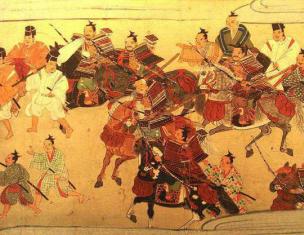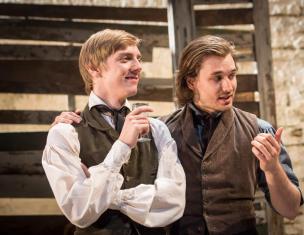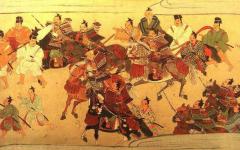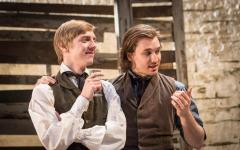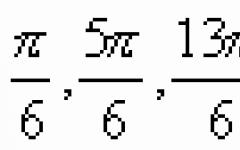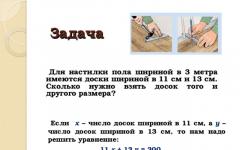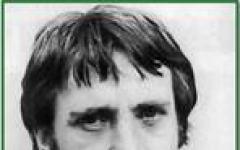There is a laid table outside, at which several young men and women are feasting. One of the feasters, a young man, addressing the chairman of the feast, recalls their mutual friend, the cheerful Jackson, whose jokes and witticisms amused everyone, enlivened the feast and dispersed the darkness that a fierce plague is now sending to the city. Jackson is dead, his chair at the table is empty, and the young man offers a drink in his memory. The Chairman agrees, but believes that they should drink in silence, and everyone drinks in silence in memory of Jackson.
The chairman of the feast turns to a young woman named Mary and asks her to sing a sad and drawn-out song from her native Scotland, and then return to the fun. Mary sings about her native side, which flourished in contentment until misfortune befell it and the side of fun and work turned into a land of death and sadness. The heroine of the song asks her beloved not to touch her Jenny and leave her native village until the infection passes, and vows not to leave her beloved Edmond even in heaven.
The chairman thanks Mary for the plaintive song and suggests that once upon a time her region was visited by the same plague as the one that is now decimating all living things here. Mary remembers how she sang in her parents’ hut, how they loved to listen to their daughter... But suddenly the sarcastic and impudent Louise bursts into the conversation with the words that now such songs are not in fashion, although there are still simple souls ready to melt from women’s tears and blindly believe them. Louise screams that she hates the yellowness of that Scottish hair. The chairman intervenes in the dispute, he calls on the feasters to listen to the sound of the wheels. A cart loaded with corpses approaches. The cart is driven by a black man. At the sight of this spectacle, Louise becomes ill, and the chairman asks Mary to throw water in her face to bring her to her senses. With her fainting, the chairman assures, Louise proved that “the gentle are weaker than the cruel.” Mary calms Louise down, and Louise, gradually coming to her senses, says that she dreamed of a black and white-eyed demon who called her to him, into his terrible cart, where the dead lay and babbled their “terrible, unknown speech.” Louise doesn’t know whether it was a dream or reality.
The young man explains to Louise that the black cart has the right to travel everywhere, and asks Walsingam to stop the disputes and “the consequences of women’s fainting” to sing a song, but not a sad Scottish one, “but a riotous, bacchanalian song,” and the chairman, instead of a bacchanalian song, sings a darkly inspired hymn in honor of the plague. This hymn contains praise for the plague, which can bestow an unknown rapture that a strong-willed person is able to feel in the face of impending death, and this pleasure in battle is “immortality, perhaps a guarantee!” Happy is he, sings the chairman, who is given the opportunity to feel this pleasure.
While Walsingham is singing, an old priest enters. He reproaches the feasters for their blasphemous feast, calling them atheists; the priest believes that with their feast they commit an outrage against the “horror of sacred funerals,” and with their delight they “disturb the silence of the coffins.” The feasters laugh at the gloomy words of the priest, and he conjures them with the Blood of the Savior to stop the monstrous feast if they want to meet the souls of their departed loved ones in heaven, and go home. The chairman objects to the priest that their homes are sad, but youth loves joy. The priest reproaches Walsingam and reminds him how just three weeks ago he hugged his mother’s corpse on his knees “and fought over her grave with a cry.” He assures that now the poor woman is crying in heaven, looking at her feasting son. He orders Walsingam to follow him, but Walsingam refuses to do this, since he is held here by despair and terrible memories, as well as by the consciousness of his own lawlessness, he is held here by the horror of the dead emptiness of his native home, even his mother’s shadow is unable to take him away from here, and he asks the priest to leave. Many admire Walsingham's bold rebuke to the priest, who conjures the wicked with the pure spirit of Matilda. This name brings the chairman into spiritual turmoil; he says that he sees her where his fallen spirit can no longer reach. Some woman notices that Walsingham has gone crazy and is “raving about his buried wife.” The priest persuades Walsingam to leave, but Walsingam, in the name of God, begs the priest to leave him and leave. Having invoked the Holy Name, the priest leaves, the feast continues, but Walsingham “remains in deep thought.”
Have you read summary tragedy Feast during the plague. We also invite you to visit the Summary section to read the summaries of other popular writers.
Please note that the summary of the tragedy Feast during the Plague does not reflect the full picture of events and characteristics of the characters. We recommend you read it full version tragedy.
Sometimes it is difficult to understand the logic of modern readers, who, instead of directly turning to the works of Russian or foreign classics, certainly want to first read their summary. “A Feast in the Time of Plague” is one of the easiest to understand and smallest works of A. S. Pushkin.
A small tragedy was written in 1830, when the poet was forced to spend three months in the village of Boldino due to a cholera epidemic that broke out in Russia. “A Feast in Time of Plague” is a free translation of a fragment of a play by the Scottish poet D. Wilson.
Plot plot
On one of the streets of the city, which finds itself in the grip of a raging plague, a table is set, laden with dishes and drinks. Here a company of several men and women had gathered who did not want to give in to despondency at such a time. scary time. They entertain each other with funny stories, jokes, songs, trying to forget about the imminent danger that threatens each of them. This is how the tragedy “A Feast in the Time of Plague”, written by Pushkin, begins. The summary of the play includes a description of the images of the characters, their characters and mood.

A man named Walsingham presides over this feast. One of the young people participating in the feast addresses the rest of those present with a speech, reminding them of their common friend - the witty and joker Jackson. He was next to them just recently, and now his chair is empty. Jackson died two days ago, struck down by a disease that spares neither old nor young. The young man offers to raise glasses in memory of his departed friend and sing a loud song in his honor.
This episode shows the reader that people gathered not for a funeral mass, but for a cheerful feast, in the figurative expression of the author - a feast during the plague. Pushkin conveys the content of this character’s speech in bright colors, emphasizing the fearlessness of youth that defies death. The Chairman approves the proposal young man, but believes that at such a moment one should not indulge in fun. Obeying the will of Walsingham, the table diners empty their glasses in complete silence.
Mary's song
Jackson's death reminded those present of the frailty of life, but they do not intend to grieve for long. This is eloquently evidenced further events. The chairman asks one of the girls to please those present by singing a song. Mary begins to sing, her beautiful soulful voice makes listeners transported to the expanses of Scotland, where home young woman.

Let's try to convey the meaning of this song and its brief content. Although the feast during the plague was conceived for the sake of detachment from dark thoughts, Mary paints for those present a sad picture of the events that took place in her homeland. The measured life of people was destroyed by the arrival of the disease, turning the prosperous region into a desert of black sorrow. A girl named Jenny, on whose behalf the song is sung, turns to her lover, asking him to leave his native village in order to avoid death. She promises the young man that she will remember him forever, even if they never manage to meet.
Louise's Dream
Walsingham, thanking Mary for the song, speaks words of consolation to her. At this moment, another girl from among the people present at the table intervenes in the conversation. Louise's speech is full of anger, she declares that no one needs mournful songs, and only weak-hearted people can sympathize with tearful narratives. Louise also throws insults at Mary herself.
The reader begins to get the impression that this feast during the plague is not such a fun event. Pushkin paints a summary of this episode in gloomy tones, especially since subsequent events can also hardly be called joyful. A cart loaded with the bodies of dead people passes along the street. Louise, who a moment ago called everyone too sentimental and sensitive, faints.
The chairman asks Mary to bring her friend to her senses. Having come to her senses, Louise says that she dreamed of a demon with a black face and empty eye sockets, calling her to his carriage. The girl cannot understand whether it was in a dream or in reality. Friends are trying to calm Louise down, and the young man asks the Chairman to sing a loud, life-affirming song in order to finally forget about sadness and sadness.

Anthem of Walsingham
The Chairman's song can hardly be called cheerful either. He sings an ode of praise dedicated to the plague, calling the raging epidemic a test sent from above, helping to strengthen the spirit of people in the confrontation with death. So in a nutshell one could convey the semantic idea of the anthem, its brief content. The feast during the plague, however, continues. There is laughter and jokes around the table. Walsing has not yet finished his song when people's eyes turn to the entering priest.
Admonitions of the Holy Elder
The priest tries to shame the feasters, calls on them not to anger God and go home. He calls the merriment reigning here blasphemy and disrespect for dead people, for daily funerals, the lamentations of widows, orphans and mothers whose children were carried away by a merciless plague.
The chairman is not moved by the priest’s words, he asks him to leave, saying that their houses are full of darkness and sadness, and only by getting together can he and his friends feel the joy of life without succumbing to general despondency.
The clergyman reminds Walsingham that just a few days ago he wept at the coffin of his dead mother. The elder conjures the Chairman and his companions to stop the fun, otherwise they will never be able to get to the heavenly abode and reunite with their relatives.
Walsingham, to the applause of those present, continues his argument with the priest, saying that even the spirit of his mother is not able to force him to leave the company of feasting friends. The old man, trying to reason with him, pronounces Matilda’s name.
Who this woman is, the reader can only guess. Perhaps this was the name of the Chairman's mother or this name belonged to his wife. The mention of Matilda causes Walsingam great emotional agitation; he jumps up from his seat and, turning to the priest, asks not to touch the name that is dear to him.
“Swear to me, with your head raised to heaven
Withered, pale hand - leave
There is a forever silent name in the coffin!
The holy elder retreats, seeing that all his persuasion is useless. This concludes the action of the little tragedy and its summary. A feast during a plague does not end with the departure of the priest. Walsingham's friends continue to sing and have fun, but he himself is no longer laughing.
In a plague city, young people are feasting on the street at a set table. The young man suggests remembering the merry fellow Jaxon, whose funny jokes enlivened the conversation and dispersed the darkness of the infection, but today he was the first of the whole company to go into the cold underground dwellings. Chairman Walsingham encourages them to drink in silence, although the young man would like to drink with the cheerful clink of glasses, as if their friend was alive.
The Chairman asks Mary to sing a sad song from her homeland of Scotland, so that later she can indulge in fun again. Mary sings that before the plague her country was prosperous, churches and schools were full, and work was in full swing in the fields. Nowadays everywhere is quiet and deserted, only in the cemetery can you hear the groans of the living. In the song, Mary turns to her beloved Edmond with a request not to approach her body after her death and to leave the village until the infection passes, and then visit her grave. Mary herself promises her soul to be with her lover forever.
The chairman thanks the thoughtful Mary: “No, nothing saddens us so much in the midst of fun as a languid sound repeated in the heart!” Louise does not share the general admiration for Mary's tearful song. At this time, a cart filled with dead bodies, driven by a black man, passes by. Louise feels sick, Mary throws water in her face. The Chairman is amazed that Louise seems courageous, but in reality there is fear in her soul.
Louise comes to her senses and talks about her vision of a black, white-eyed demon who called her into his cart with the dead, and the dead “babbled a terrible, unknown speech.” The young man tries to cheer up Louise: their entire street has become a refuge from death, a haven of feasts, but the cart can pass everywhere. The young man asks the Chairman to sing not a sad song, but a “violent bacchanalian.”
The chairman does not know such a song, but sings a hymn to the plague, composed by him that night. The hymn compares the plague to winter. Winter can be resisted with the help of fireplaces and the heat of feasts, but how can one resist the plague that knocks on the window with a grave shovel? The chairman believes that the same means are suitable against the plague: you need to feast, glorifying its kingdom. Man is attracted to everything deadly: battle, a dark abyss, an angry ocean, a deadly desert and plague. We need to praise her for giving the living the pleasure of the feeling of immortality, and have fun.
The Priest turns to the feasters and reproaches them for godlessness, for the fact that with their raptures they disturb the silence of the coffins and shake the earth over the dead, buried in a common pit, mourned by praying old men and wives. The laughter of the feasters reminds the Priest of demons tormenting the lost spirit of the atheist. The priest conjures the young people with the blood of the Savior to interrupt the monstrous feast and go home. The chairman objects that their houses are sad and empty, and “youth loves joy.”
The priest calls Walsingham with him and reminds him that three weeks ago he wept at the tomb of his mother, who is now crying in heaven, looking at her son. Walsingham objects that he is driven to such a godless act by despair, a terrible memory, awareness of his lawlessness, the terrible emptiness of the house, the memory of the caresses of his beloved wife. The Chairman curses everyone who goes with the Priest.
The priest resorts to the last resort and reminds Walsingham the name of his beloved deceased wife Matilda. Walsingham urges not to disturb the name of the one from whom he would like to hide his current life; he does not expect to go to heaven and see his wife. When the Chairman again begs the holy father to leave him, the Priest blesses him and asks for forgiveness as he leaves. The feast continues, and the Chairman thinks deeply.
There is a laid table outside, at which several young men and women are feasting. One of the feasters, a young man, addressing the chairman of the feast, recalls their mutual friend, the cheerful Jackson, whose jokes and witticisms amused everyone, enlivened the feast and dispersed the darkness that a fierce plague is now sending to the city. Jackson is dead, his chair at the table is empty, and the young man offers a drink in his memory. The Chairman agrees, but believes that they should drink in silence, and everyone drinks in silence in memory of Jackson.
The chairman of the feast turns to a young woman named Mary and asks her to sing a sad and drawn-out song from her native Scotland, and then return to the fun. Mary sings about her native side, which flourished in contentment until misfortune befell it and the side of fun and work turned into a land of death and sadness. The heroine of the song asks her beloved not to touch her Jenny and leave her native village until the infection passes, and vows not to leave her beloved Edmond even in heaven.
The chairman thanks Mary for the plaintive song and suggests that once upon a time her region was visited by the same plague as the one that is now decimating all living things here. Mary remembers how she sang in her parents’ hut, how they loved to listen to their daughter... But suddenly the sarcastic and impudent Louise bursts into the conversation with the words that now such songs are not in fashion, although there are still simple souls ready to melt from women’s tears and blindly believe them. Louise screams that she hates the yellowness of that Scottish hair. The chairman intervenes in the dispute, he calls on the feasters to listen to the sound of the wheels. A cart loaded with corpses approaches. The cart is driven by a black man. At the sight of this spectacle, Louise becomes ill, and the chairman asks Mary to throw water in her face to bring her to her senses. With her fainting, the chairman assures, Louise proved that “the gentle are weaker than the cruel.” Mary calms Louise down, and Louise, gradually coming to her senses, says that she dreamed of a black and white-eyed demon who called her to him, into his terrible cart, where the dead lay and babbled their “terrible, unknown speech.” Louise doesn’t know whether it was a dream or reality.
The young man explains to Louise that the black cart has the right to travel everywhere, and asks Walsingam to stop the disputes and “the consequences of women’s fainting” to sing a song, but not a sad Scottish one, “but a riotous, bacchanalian song,” and the chairman, instead of a bacchanalian song, sings a darkly inspired hymn in honor of the plague. This hymn contains praise for the plague, which can bestow an unknown rapture that a strong-willed person is able to feel in the face of impending death, and this pleasure in battle is “immortality, perhaps a guarantee!” Happy is he, sings the chairman, who is given the opportunity to feel this pleasure.
While Walsingham is singing, an old priest enters. He reproaches the feasters for their blasphemous feast, calling them atheists; the priest believes that with their feast they commit an outrage against the “horror of sacred funerals,” and with their delight they “disturb the silence of the coffins.” The feasters laugh at the gloomy words of the priest, and he conjures them with the Blood of the Savior to stop the monstrous feast if they want to meet the souls of their departed loved ones in heaven, and go home. The chairman objects to the priest that their homes are sad, but youth loves joy. The priest reproaches Walsingam and reminds him how just three weeks ago he hugged his mother’s corpse on his knees “and fought over her grave with a cry.” He assures that now the poor woman is crying in heaven, looking at her feasting son. He orders Walsingam to follow him, but Walsingam refuses to do this, since he is held here by despair and terrible memories, as well as by the consciousness of his own lawlessness, he is held here by the horror of the dead emptiness of his native home, even his mother’s shadow is unable to take him away from here, and he asks the priest to leave. Many admire Walsingham's bold rebuke to the priest, who conjures the wicked with the pure spirit of Matilda. This name brings the chairman into spiritual turmoil; he says that he sees her where his fallen spirit can no longer reach. Some woman notices that Walsingham has gone crazy and is “raving about his buried wife.” The priest persuades Walsingam to leave, but Walsingam, in the name of God, begs the priest to leave him and leave. Having invoked the Holy Name, the priest leaves, the feast continues, but Walsingham “remains in deep thought.”
Summary of Pushkin’s tragedy “A Feast during the Plague”
Other essays on the topic:
- In Pushkin, the entire content of the dramatic scene is a feast during the plague. But this feast is philosophically chaste, and not riotous in nature. Conflict...
- The Chairman's Anthem, filled with fierce faith in man, glorifies his inherent ability and ability to be stronger than hostile circumstances. A humble person is morally...
- The last work in a row dramatic scenes was "A Feast in Time of Plague." The “reason” for its creation was Wilson’s dramatic poem “The Plague...
- April. In a Russian village they stand german soldiers. The snow is melting, the corpses of those killed in winter peek out from the mud mixed with water. They deliver to Rota...
- The young knight Albert is about to appear at the tournament and asks his servant Ivan to show him his helmet. The helmet was pierced through in the last fight...
- Don Juan and his servant Leporello are sitting at the gates of Madrid. They are going to wait here for the night to enter under its cover...
- Composer Salieri sits in his room. He complains about the injustice of fate. Remembering his childhood years, he says that he was born...
- February 20, 1598 It has already been a month since Boris Godunov shut himself up with his sister in a monastery, leaving “everything worldly” and...
- The novel is an eyewitness account of a survivor of the plague that broke out in 194... in the city of Oran, a typical French prefecture in Algerian...
- It seems clear: the scene is Elsinore, the residence of the Danish kings. The text of the play repeatedly emphasizes that everything happens in Denmark during...
- The action takes place in Germany in the 18th century, at the court of one of the German dukes. The son of President von Walter is in love with the daughter of a simple...
- Many of his contemporaries continued to look at Pushkin as a romantic poet and demanded from him works in the spirit of “Prisoner of the Caucasus.”...
- In what time do the characters in Pushkin’s novel live and act? It’s not difficult to calculate: Onegin did not participate in Patriotic War 1812. She...
They struck cities and countries, because there was only one way to escape: to run quickly, far and for a long time. Only religion, its rituals and faith could help those who remained overcome the fear of death. This is a description of the attitude towards the “pestilence”, its brief content. No one dared to organize a feast during the plague.
But numerous images of The Triumph of Death appeared.
Boldino autumn
Before his son’s marriage, his father gave him the village of Kistenovo, and the poet went to take over the inheritance. Kistenovo is a village near Boldino. He expected only a month, but was delayed by three due to the cholera epidemic that occurred in Moscow. Pushkin called it a plague for himself.

You can’t get to Moscow - there are quarantines all around. The poet works fruitfully, but he is consumed by concern for his family and friends who remained in “plague-ridden” Moscow. Under such circumstances, the poet makes for himself from the English “City of the Plague,” dedicated to the plague that raged in London in 1666 and, rethinking its content, writes his original essay “A Feast in the Time of Plague,” a brief summary of which will now be presented.
On the street. At a set table
Only madmen remained in plague-ridden places. Their meeting on the street at a set table is described by Pushkin. A group of young people raise their glasses in memory of the cheerful Jackson, who two days ago enlivened the general conversation with jokes and witticisms. Now his chair stands empty - the plague has not spared him. The chairman invites Mary to sing something sad. She sings a plaintive song about places that once flourished, where now there are only cemeteries. They are not empty and are constantly replenished. And if the singer is destined to die, then she asks her beloved in the distance to accompany her to last path and leave these places until the infection leaves them. And only then visit the ashes of the deceased girl.

The chairman expresses gratitude to Mary for the song about her native places, which were once visited by the plague and where pitiful groans were heard. Louise joins the conversation. She is against tearful songs. But at this time a cart loaded with dead people passes by them. Louise falls into oblivion. Mary brings her to her senses, and Louise complains that it seemed to her that the dead were calling her to follow them. Then they explain to Louise that these carts with the dead have the right to travel everywhere, and ask Chairman Walsingam to sing a riotous song that should appear over the boiling bowl. This is the beginning of the story that Pushkin tells, its summary. The feast continues during the plague.
Walsingham's Song
The Chairman turned to poetry for the first time in his life last night and created a hymn to the Plague. He sings with inspiration in a hoarse voice.

In Russia, the lines of this anthem have been snatched up for quotes. Many people don’t even know where they get these sayings from. We know Pushkin without reading it, but it would be nice to read and think about it. But this is the essence of it. When cold Winter comes, everyone hides in warm houses near lit fireplaces and has fun at hot feasts. And now the formidable Queen - the Plague - is knocking on all the windows. How to escape from it? Yes, just like from Winter - lock yourself up, light the fires, pour glasses and start feasting, throwing balls. There is an inexplicable rapture in battle and on the edge of a dark abyss. So when meeting the Plague, which threatens death and destruction, there is a strange pleasure - with bated breath, to see who will overcome whom. And therefore let us praise the Plague - we are not afraid of the darkness of the grave and together we fill our glasses and feast. Courage mixed with fear that must be overcome is the meaning of Walsingham's song, its summary. A feast during the plague is a courageous and desperate resistance to the irresistible plague that strikes all living things.
Appearance of the Priest
The priest immediately, without preludes or introductions, begins by cursing the people sitting at the table. He says that they are atheists and their songs are mockery, debauchery and mockery of death and the grief of funerals. “I hate,” he continues, “your delights. The earth shakes from your chants over the graves of the dead. They do not allow old men and women to give themselves up to crying over the buried. Demons have possessed you, no less, and are dragging you to themselves.” This is the priest’s sincere sermon to a group of young people, its summary. A feast during a plague is a blasphemy that defies either understanding or description. But the youth are not at all embarrassed. They only suggest that he leave. But the priest went wild as if in a pulpit; he could not be stopped. He continues. He begs, reminding us of the shed blood of Christ, for everyone to go home, ending this ugly feast. The chairman objects to him. He says that everyone has sadness and grief in their homes, but youth needs joy.

The priest, looking closely at the speaker, asks: “Is it really you, Walsingham, you who sobbed over the corpse of your mother and could not tear yourself away from her grave? Do you think that she doesn’t see all this from heaven and doesn’t cry because you don’t want to hear the holy words?” But Walsingham objects bitterly. He describes his despair at the sight of an empty house. “Only,” he says, “a full cup will drown out and dull the consciousness of loneliness. Even if my behavior is lawless, I will remain at the feast and curse the one who leaves here. And you, old man, go away, you have no place here.” But the priest tries to soothe his emotional wounds by reminding him of his beloved but deceased wife. This is how Pushkin describes a feast during the plague. The summary boils down to overcoming the fear of death in three ways. The first is prayer and humility, the second is oblivion, and the third is Walsingham’s song as the indestructibility of the human spirit under the formidable trials of fate.
Conclusions
Walsingham's position is closest to Pushkin. Walsingham, listening to the priest, at some point hesitates, especially when he is reminded of the wife whom he loved immensely. But the hated plague carried her away. The Walsings remain. Pushkin gives a remark that completes the story: the chairman was deeply immersed in thought. This is the summary of the story “A Feast during the Plague” by A. S. Pushkin.


